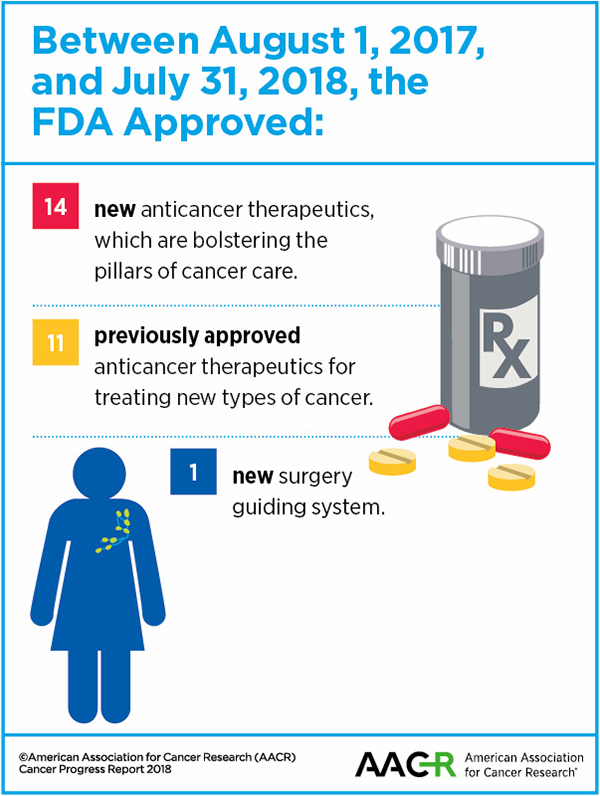AACR Cancer Progress Report 2018: Harnessing Research Discoveries for Patient Benefit
Today, the American Association for Cancer Research (AACR) released its eighth annual Cancer Progress Report. The report highlights how federally funded research that provides a deep understanding of the complexities of cancer is spurring advances across the clinical cancer care continuum and improving survival and quality of life for people around the world. The report is prefaced by a message from Elizabeth M. Jaffee, MD, AACR President, and Margaret Foti, PhD, MD (hc), AACR Chief Executive Officer. This message is reproduced here; you can read the full report here and watch a summary of the report in this video.
https://youtu.be/AvyqxgCfhLQ
A Message From the AACR
There has never been a time of greater excitement in the cancer field. Thanks to advances in research, we are altering the trajectory of the devastating collection of diseases we call cancer. Research has spurred progress in public health and improvements across the cancer care spectrum that are reducing overall cancer incidence and death rates and increasing the number of people who are living longer, higher quality lives after a cancer diagnosis. Moreover, we are poised to drive forward and catalyze breakthroughs that will save more lives from cancer.
Cancer Progress Report 2018 provides a comprehensive overview of the progress we are making because of research, much of which is supported by federal investments in the National Institutes of Health (NIH) and National Cancer Institute (NCI). As highlighted in the report, the pace at which basic research is deepening our knowledge of the complexities of cancer and the rate at which we are harnessing this knowledge to develop new and better approaches to cancer prevention, early detection, diagnosis, and treatment are accelerating for the benefit of cancer patients. 
One of the areas of cancer treatment in which we are making extraordinary progress is immunotherapy. In the past decade, the number of immunotherapeutics has increased almost five-fold, and the number of cancer types that can be treated by at least one immunotherapeutic has more than tripled.
The most recent immunotherapeutics to enter the clinic, CAR T–cell therapies, took us across another medical frontier because they are generated by genetic engineering of a patient’s own immune cells to attack the patient’s cancer cells. Expanding our knowledge about the immune system and how it interacts with cancer cells, and facilitating the convergence of experts from an increasingly diverse array of disciplines will allow us to make even more pioneering advances in immunotherapy for the benefit of patients in the United States and around the world.
Discoveries in the field of cancer genomics are continuing to fuel the development of new molecularly targeted therapeutics, which are transforming the treatment of more and more types of cancer. As we step further into the era of precision medicine, the scope of progress will continue to broaden, providing new hope for many cancer patients who are awaiting more effective treatment options.
Despite the significant strides we are making against cancer, there is a vital need for continued transformative research. This urgency is underscored by the sobering reality that cancer will claim more than 609,000 lives in the United States this year. This number is predicted to increase considerably in the coming decades—because cancer is largely a disease of aging, and the segment of the U.S. population age 65 and older is growing—unless we develop and effectively implement new and even more effective strategies for cancer prevention, early detection, diagnosis, and treatment.
Moving forward, we also need to ensure that everyone benefits from groundbreaking advances against cancer. Cancer can strike anyone—no age, gender, race, ethnicity, socioeconomic status or political affiliation makes you immune to these devastating diseases. However, as highlighted in the report, advances against cancer have not benefited everyone equally, and certain segments of the population shoulder a disproportionate burden of cancer. This is unacceptable, and it is imperative that all stakeholders in the research community work together to more fully understand the reasons for cancer health disparities and then immediately develop and implement plans to eliminate them.
We have never been in a better position to take lifesaving cancer science from the bench to the clinic. We have the scientific knowledge, cutting-edge technologies, and capability to deliver a new wave of innovations that will transform cancer care. We also have bipartisan leadership in Congress that has delivered three consecutive years of steady, significant annual funding increases for biomedical research through the NIH, which will help us take advantage of these unprecedented opportunities.
Ensuring that biomedical research remains a high priority for our nation’s policy makers is vital if we are to further accelerate our pace of progress. Thus, the AACR urges our elected leaders to continue to support robust, sustained, and predictable annual growth of the NIH budget, and to provide consistent and sufficient annual funding for the U.S. Food and Drug Administration (FDA) and the Centers for Disease Control and Prevention (CDC). These actions will guarantee that we take major strides toward realizing the goal of fundamentally changing the face of cancer at the earliest possible time.



